Too tired to post much today, so I’ll just do a little photo-journal thing.
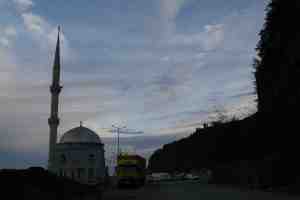
Dawn breaking as we passed the border into Turkey. Naturally the first object one comes across is a mosque, just as on the Georgian side of the border there’s a stately church that overlooks the border. Also a few shops and a surprising number of people loitering about.
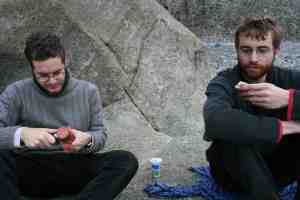
We went to the beach nearby and had an impromptu breakfast of Czech sausage, Georgian bread, Snickers and vodka. Breakfast of champions.
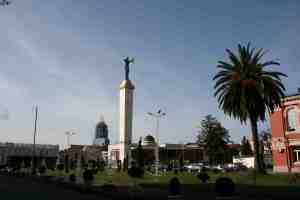
One of the two main squares in Batumi; the statue is I think of Medea holding up the Golden Fleece. It’s a tolerably pleasant town; it must be packed in summer. The buildings are in decent condition, and there are plenty of nice cafes and restaurants. There’s a nice waterfront promenade, too.
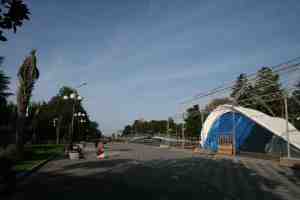
One of the main avenues through the part near the Black Sea coast. The structure on the right looks like a small stage, where they hold events during the summer season. Beyond it there’s a long pool with dozens of fountains, which are the best part of the whole park: they function in time with music broadcast from nearby speakers. While I was there, in the evening, there was a funky remix of the Brindisi from La Traviata, and the fountains danced and whirled in time with the music. Excellent.
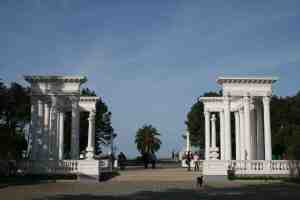
Just beyond the palm tree in the middle is the sea.
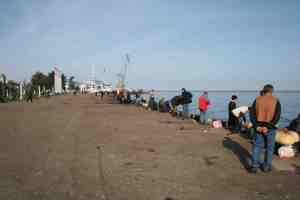
Waterfront, by the pier.
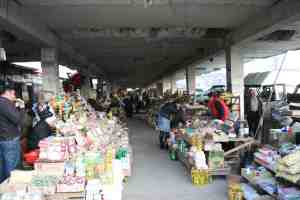
The bazaar in Batumi.
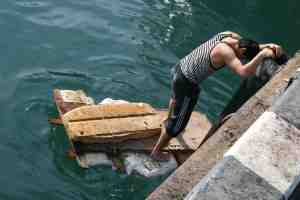
This guy climbed down onto a home-made raft, and then paddled away into the bay.
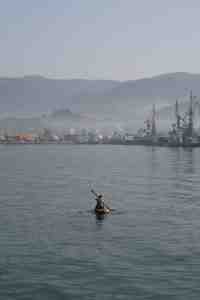
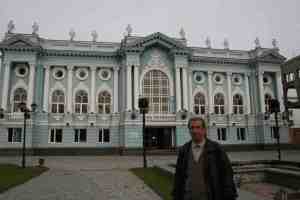
Friendly fellow who brought me to the theater in Senaki. On Sunday Ian had left for Tbilisi, and Ben was going further north to Zugdidi, so I took marshrutkas cross country towards Kutaisi, stopping in various villages. One of my friends is from Senaki, so I thought I’d stop by on my way to Kutaisi. She told that the only thing worth seeing was the theater, so I walked around trying to find it, and finally asked this man where it was. He thought for a moment, and decided to walk me there himself. When we got there, he pointed to the building and said “Director!”, which I took to mean that he assumed I wanted to talk to the director of the theater. I demured, but he insisted, so I soon found myself in a large office with seven or eight people (I had disturbed a meeting of some sort), and introduced to the manager of the theater, a tall burly man of about 50 in a large black sheepskin overcoat, with a resonant voice and loud laugh. I introduced myself as best I could in Georgian, and hastily phoned my friend, who translated. He had one of the directors give me a tour of the theater, which was quite attractive if simple. One section had been damaged during the Russian occupation this summer, and he showed it to me with particular scorn, scowls and dismissive gestures.
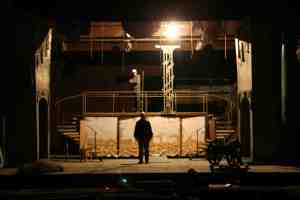
Then he brought me inside the auditorium to see the rehearsals of their current production, an old play (early 19th century, if I understood correctly) about disagreements with Russia over Abkhazia, he told me with raised eyebrows.
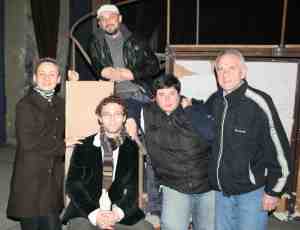
Actors and actresses. The girl to my left is Tea, who showed me around the theater, and afterwards took me to a nearby cafe for a cup of coffee. They were all extremely friendly; with the help of my friend back in Tbilisi (on the phone), we managed to communicate, and they showed me around the town, and took me to the bus stop, got me a ticket to Kutaisi, and waited with me until the marshrutka left.
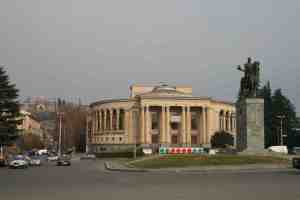
The main square in Kutaisi. The building is the state theater, he statue is of David the Builder, who ruled here until he united eastern and western Georgia and relocated his capital to Tbilisi. In the background on the left one can just make out the old ruined cathedral, one of the main sights in town. I arrived in late afternoon, and walked around while the light lasted. A tolerably pleasant place; a nice large central park flanked by the theater, a government building, a modest opera (closed, but advertising a performance of Oedipus Rex), a street of shops, and the site of what used to be the main (and, according to my guidebook, the only) hotel in town, until it recently burned to the ground. Several parts of the city look dilapidated, but it was obvious that a lot of effort had gone into restoring and building.
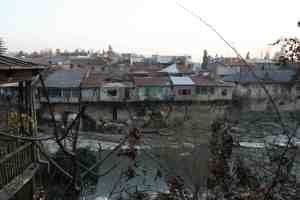
From the river bank.
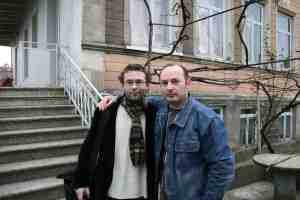
Giorgi, outside his homestay. A great place: Giorgi and his daughter both speak good English, and are warm and hospitable people. I got there around 7, and they showed me around, offered me a variety of refreshment, and then took me to my room.
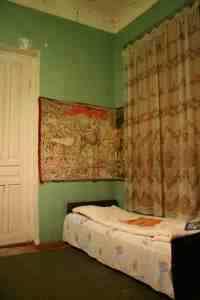
Cozy and comfortable. I was exhausted by 10, and slept well.
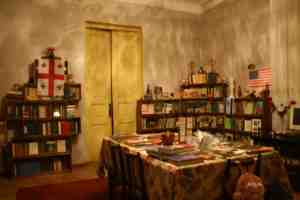
Living rooom. Giorgi showed me the guestbook, told me of his previous guests, told me about Kutaisi, and about his life while we played a few games of dominoes.
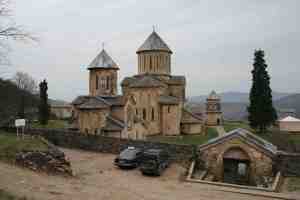
In the morning I went to Gelati, an ancient monastery complex founded by David the Builder about 15 minutes from town. There was also an academy of sorts, on the other side of the church, where scholars and monks were encouraged to keep the spirit of Athens alive.
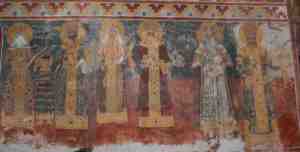
A nice fresco of David (far right, holding the church) and his descendants. The only one I’d heard of was Queen Tamar, fourth from left.
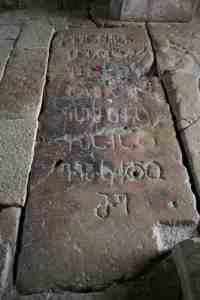
The tomb of David the Builder in Gelati. It spans the entry-way through which all the traffic would have gone; my guidebook (Lonely Planet) says he left instructions for his tomb to be placed there so that everyone who entered the monastery would have to step on his tomb, an unusual gesture of modesty for so powerful a man.
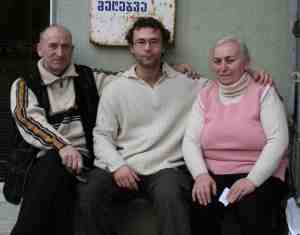
Back in town that afternoon, I walked around and checked out the parts of the city I hadn’t seen the previous day. At one point I sat down on this bench for a quick rest and consulted my guidebook. A man came out from the shop next door, and struck up a conversation. “Do you like wine?” he asked. I replied that I did, in general; he then dragged me inside his shop, through a back door that led to his living quarters, and called out “Lia!”; a friendly woman promptly started to cover the table with all kinds of food: sausages, bread, cheese, cabbage, eggplant, fruit, and, of course, two or three different kinds of wine. With the occasional help of my friend back in Tbilisi, we had a pleasant conversation.
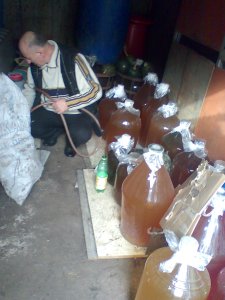
Finally I told him that I needed to get back to Tbilisi that day, so he took me out back to his garage, and filled two bottles of wine, and a bottle of chacha. He also gave me a large pumpkin. He took me to the main street next to his house, and flagged down the right marshrutka, and instructed one of the passengers to make sure I got off at the stop for the main bus station.
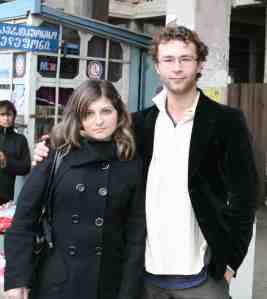
The daughter of the passenger my friendly host had told to direct me to the bus station. At the appropriate stop, the two of them pulled me out of the marshrutka and walked me to the central bus station about five minutes away. The daughter spoke some English, so we chatted as her mother led the way to the station. Once there they bought my ticket, sat me down in the bus, and instructed the person sitting next to me to make sure I got off at the right station in Tbilisi.
So a good trip.
Filed under: Uncategorized | 2 Comments »

